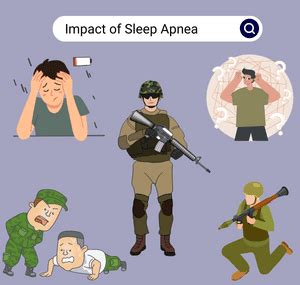Sleep Apnea: A Threat to Military Readiness?
Sleep apnea, a condition characterized by pauses in breathing during sleep, is far more than a simple inconvenience. It significantly impacts an individual's overall health and well-being, and its effects are particularly concerning within the context of military readiness. This article will explore the link between sleep apnea and military performance, examining its impact on cognitive function, physical fitness, and overall operational effectiveness.
What is Sleep Apnea?
Sleep apnea is a common disorder where breathing repeatedly stops and starts during sleep. There are two main types: obstructive sleep apnea (OSA), the most common type, occurs when the airway becomes blocked; and central sleep apnea (CSA), where the brain fails to send signals to the muscles that control breathing. The consequences of untreated sleep apnea extend far beyond daytime sleepiness.
How Does Sleep Apnea Impact Military Personnel?
The demanding physical and mental requirements of military service make individuals with sleep apnea particularly vulnerable. The constant lack of restorative sleep leads to a cascade of negative effects:
-
Impaired Cognitive Function: Chronic sleep deprivation, a hallmark of sleep apnea, severely impairs cognitive functions such as attention, concentration, reaction time, and decision-making. These are crucial skills for military personnel in high-pressure situations. Even minor lapses in judgment can have catastrophic consequences.
-
Reduced Physical Fitness: Sleep is essential for muscle repair and recovery. Sleep apnea disrupts this process, leading to decreased physical endurance, strength, and overall fitness levels. This is especially detrimental for roles requiring high levels of physical exertion.
-
Increased Risk of Accidents: Excessive daytime sleepiness, a common symptom of sleep apnea, significantly increases the risk of accidents, both on and off duty. This risk extends to operating heavy machinery, driving vehicles, and performing tasks requiring precise coordination and alertness.
-
Mental Health Issues: The chronic stress and fatigue associated with sleep apnea can contribute to the development or exacerbation of mental health issues such as depression, anxiety, and post-traumatic stress disorder (PTSD). These conditions further compromise military readiness.
What are the Screening and Treatment Options?
The military recognizes the significance of sleep apnea and actively screens service members for the condition. Screening often involves questionnaires about sleep habits and symptoms, followed by polysomnography (PSG), a sleep study that measures various physiological parameters during sleep.
Treatment options for sleep apnea vary depending on the severity of the condition and can include:
-
Continuous Positive Airway Pressure (CPAP): This is a widely used treatment involving a mask that delivers a continuous stream of air to keep the airway open during sleep.
-
Oral Appliances: These custom-made devices reposition the jaw and tongue to improve airway patency.
-
Surgery: In some cases, surgery may be necessary to correct structural issues contributing to airway obstruction.
Can Sleep Apnea Lead to Deployment Limitations?
Severe, untreated sleep apnea can certainly impact deployment suitability. The risks associated with impaired cognitive function, reduced physical fitness, and increased accident proneness are simply too significant to ignore. Military medical professionals carefully assess the individual's condition and determine whether deployment is safe and feasible.
How is the Military Addressing Sleep Apnea?
The military is actively working to improve early detection and management of sleep apnea. This includes implementing comprehensive screening programs, providing access to diagnostic testing and treatment, and educating service members about the importance of sleep hygiene.
What are the Long-Term Effects of Untreated Sleep Apnea on Military Personnel?
Untreated sleep apnea can have significant long-term consequences, including an increased risk of cardiovascular disease, stroke, and type 2 diabetes. These conditions can lead to early retirement from military service and significantly impact quality of life.
What are some preventative measures for sleep apnea?
Maintaining a healthy weight, avoiding alcohol and sedatives before bed, and getting regular exercise are all crucial in preventing or managing sleep apnea. Additionally, adopting good sleep hygiene practices—maintaining a regular sleep schedule and creating a conducive sleep environment—can significantly improve sleep quality and reduce the risk of developing sleep apnea.
In conclusion, sleep apnea poses a substantial threat to military readiness. By prioritizing early detection, effective treatment, and preventative measures, the military can significantly mitigate the negative impact of sleep apnea and maintain the highest levels of operational effectiveness.

